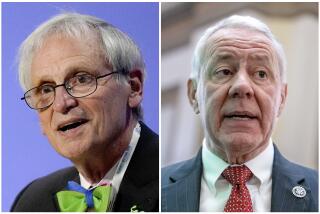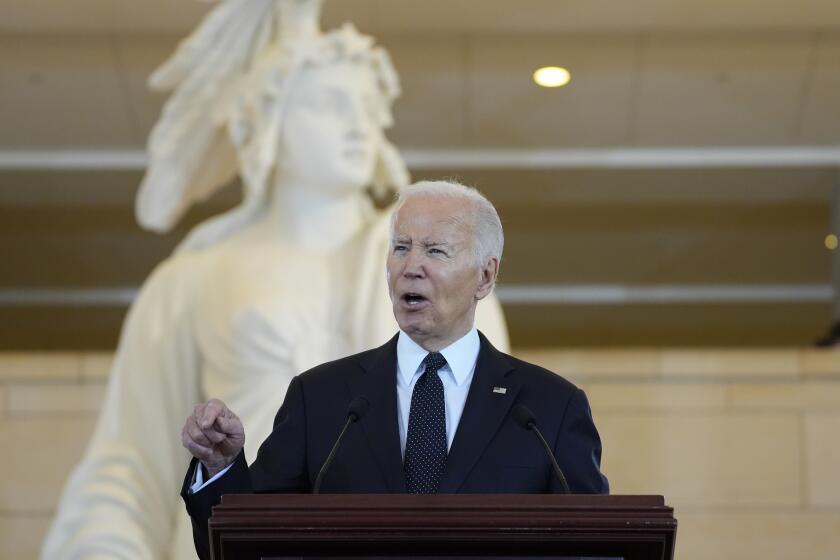Republicans in Congress soften tone, if not positions
Republican leaders in Congress are striking a softer, more conciliatory tone, dialing back the hard-line opposition that has defined their recent rise to power but has done little to boost their standing in public opinion polls.
The change in style does not necessarily match a shift in substance. Republicans continue to show little willingness to bend on the key issues driving the debate over joblessness, deficits and the role of government.
But in their legislative agenda and speeches, including House Speaker John A. Boehner’s address to the influential Economic Club of Washington on Thursday, a new approach is clear. Boehner (R-Ohio) discussed “common ground” and was careful not to dismiss out of hand key elements of President Obama’s new jobs bill.
Although the partisan battles of the last six months have taken a toll on Obama’s approval ratings, congressional Democrats and Republicans have suffered more in the eyes of voters who want to see the parties in Washington work together. Approval of congressional Republicans has fallen below 30% in recent surveys.
As Obama hit the road this week to sell his $447-billion jobs plan, a new Gallup poll showed supporters of his entire jobs package with an edge over opponents, 45% to 32%. Large majorities favored pieces of the bill, including cutting the payroll tax for workers, helping hire more teachers and first responders, and repairing roads and bridges.
Perhaps in response to numbers like that, Boehner’s speech Thursday hit some new notes.
“There are some in both parties who would rather do nothing. They’d prefer to sit this one out, waiting to be dealt a better hand down the road, after the next election,” he said. “That’s not what I was elected to do. This is the hand we’ve been dealt.”
Republican aides say the decision to shelve the boxing gloves for now is a result of the emergence of jobs as the top issue. GOP leaders have long promised to work with Democrats on the few areas of potential agreement related to job creation, they argue.
Still, the prospect of backing away from a fight did not sit well with the conservative wing of the party.
Conservative Republicans have fueled almost every debate in this session of Congress, pushing their leaders to pick fights with White House and Democrats, sparking a pair of bitter battles that threatened to shut down the federal government and left the United States on the brink of default.
This week, the right flank was ready to fight anew over spending levels for the coming fiscal year, which begins Oct. 1. More than 50 conservative Republicans signed a letter organized by Rep. Jeff Flake (R-Ariz.), asking the leadership for lower spending levels than the amount agreed upon with Democrats and the White House as part of the summer debt ceiling deal. They wanted to cut an additional $24 billion, to the level reached in the House-passed budget earlier this year.
But House Republican leaders decided to take a pass. After months of appeasing the “tea party”-aligned voices in their ranks, especially the young “whippersnappers,” as Boehner called the freshman class, House leaders appeared to be mindful of the political limits of opposition. Boehner and his leadership team preferred to endure the blowback within the party rather than risk a government shutdown.
Where they once promised purity and resolve, GOP leaders now speak of consensus.
“Tone matters a lot right now,” said Rep. Greg Walden (R-Ore.), who is close to the leadership. “We are cognizant the public is very frustrated.”
Republicans also are mindful of not playing into Democratic strategy. Obama and Democrats in Congress have sought to portray the GOP as driven by uncompromising activists. In public appearances, Obama has repeatedly urged voters to join him in fighting for the jobs bill.
“He’s trying to make this ‘me versus the Republicans,’ but the Republican rhetoric isn’t really allowing that,” GOP strategist Doug Heye said.
Tweaking the GOP message has yet to lead to results. Both parties remain unmovable on their fundamental positions — particularly whether taxes should be raised on high earners to reduce debt and promote job growth.
Boehner continues to flatly reject new revenue to pay for Obama’s jobs plan.
Just moments after Boehner called on members of both parties to “leave the ‘my way or the highway’ philosophy behind,” he said, “Tax increases, I think, are off the table.”
Even the payroll tax breaks Obama has proposed, one for workers and another for employers that make new hires — policies GOP leaders have indicated could be areas of compromise — are receiving a mixed response from the ranks.
Freshman Republican Rep. Nan Hayworth of New York is among those who are weighing the public’s dissatisfaction as they hold fast to the principles that sent them to Washington.
“The constituents, the people I serve, want us to work constructively,” Hayworth said. “I feel there’s a desire to get things done and keep the internal disagreements to a minimum.”
kathleen.hennessey@latimes.com
More to Read
Start your day right
Sign up for Essential California for news, features and recommendations from the L.A. Times and beyond in your inbox six days a week.
You may occasionally receive promotional content from the Los Angeles Times.








